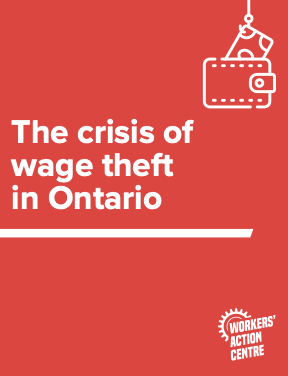
The Crisis of Wage Theft in Ontario
The Workers’ Action Centre’s new report exposes the scale of wage theft in Ontario, its causes, and what changes we need to protect our hard-earned wages.
Organizing for Fair Employment

The Workers’ Action Centre’s new report exposes the scale of wage theft in Ontario, its causes, and what changes we need to protect our hard-earned wages.
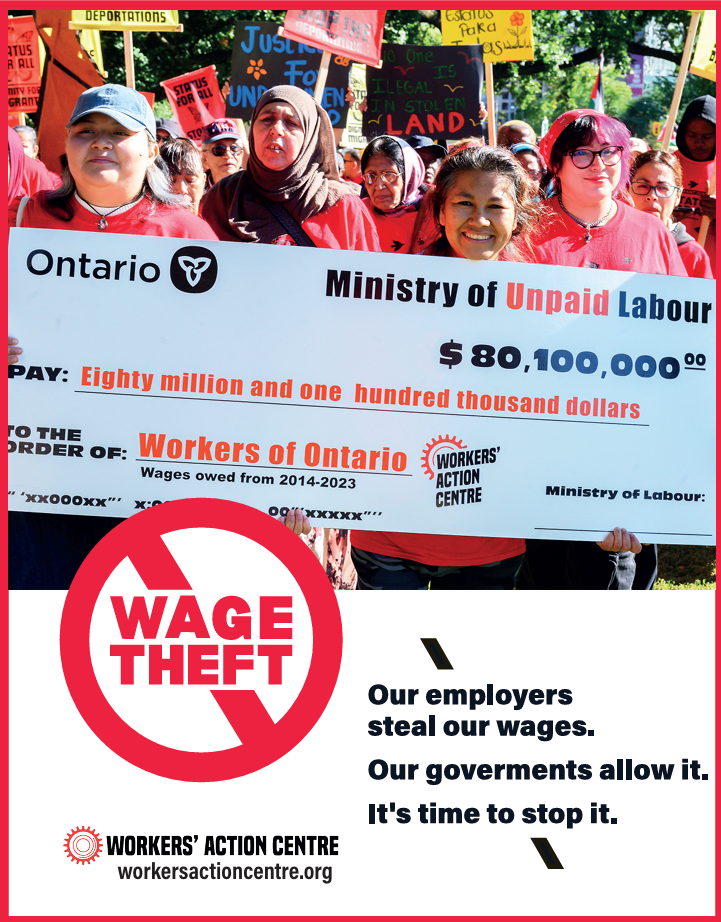
Want to talk to your friends and coworkers about the epidemic of wage theft in Ontario but don’t know how? Dive into this organizer primer about the causes (and possible solutions) to wage theft in Ontario.

The Workers’ Action Centre, Justice 4 Workers, TTCriders, Migrant Workers Alliance for Change, and Cycle Toronto wrote this letter to TTC board members and city councillors, urging against a blanket or seasonal ban of lithium-ion-powered micromobility devices from TTC vehicles and stations. The ban would include e-bikes and e-scooters, and was proposed in an October 29, 2024 TTC staff report. This letter outlines alternative regulations and TTC policy considerations.

Bill 190 is the Ontario government’s fifth omnibus bill including changes to labour and employment legislation. Our submission focuses on Schedule 2, which proposes changes to the Employment Standards Act, 2000. Like previous Working for Workers Acts, the Bill does not offer meaningful protections to Ontario’s workers or help to improve their quality of life.

These submissions are made on behalf of the Workers’ Action Centre (WAC), Parkdale Community Legal Services (PCLS), and the Income Security Advocacy Centre (ISAC). Each year, our organizations support thousands of workers in low wage and precarious employment. The proposed job posting rules are intended to increase equity and fairness in the hiring process, and provide workers with greater certainty and transparency while on the job hunt. However, as mentioned throughout these submissions, more substantive protections are needed to ensure that workers, particularly newcomers and those from equity-seeking groups, have access to decent work in today’s job market. Our many recommendations center three core needs which we urge the provincial government to consider: 1) Prioritize minimum standards enforcement by proactively investigating and auditing employer practices; 2) Take a more robust approach to pay equity and fairness by instituting anti-retaliation and reporting mechanisms, similar to the Pay Transparency Act, 2018; and 3) Reduce loopholes and exemptions which would allow employers to meet the requirements of the law without engaging in meaningful equity practices.

This joint submission from the Workers’ Action Centre (WAC) and Parkdale Community Legal Services (PCLS) explains why the government’s current proposals will not achieve adequate job-protected leave for illness and/or injury. Access to paid job-protected sick leave is a crucial component of the decent work agenda that we have long been advocating for. Ontario should strive to create a comprehensive and practical approach to sick leave that works in tandem with federal benefit programs. In accordance with public health advice and the principles of equity, security, and human dignity that underpin decent work, sick leave should be widely accessible, provide sufficient financial support and job security, and be fairly and efficiently administered.
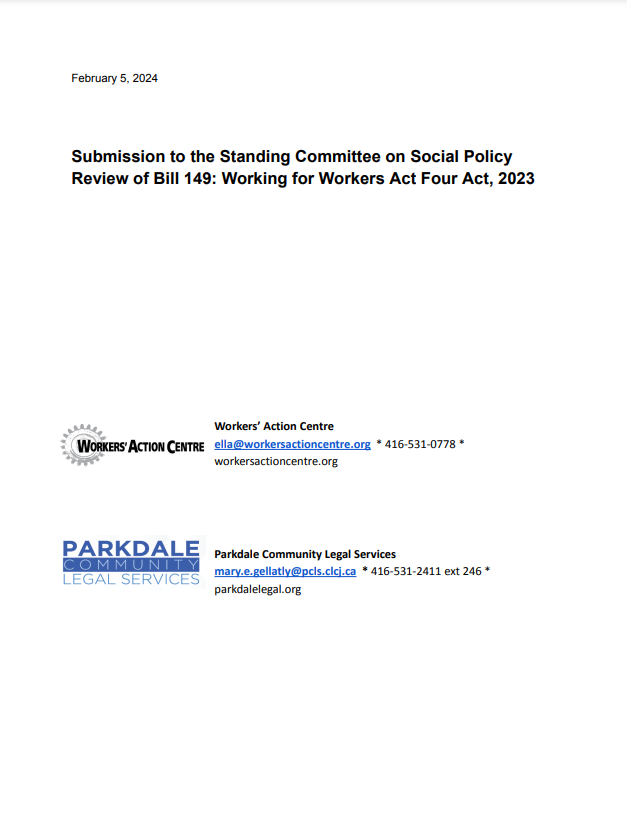
These submissions are made on behalf of the Workers’ Action Centre (WAC) and Parkdale Community Legal Services (PCLS). Similar to the previous omnibus Working for Workers Acts, 2021, 2022, and 2023, Bill 149 makes many changes to Ontario’s employment laws without meaningfully contributing to workers’ rights and entitlements. In many respects, the proposed changes restate protections for workers which are already in the existing legislation, or create weak disclosure requirements for employers. It is our opinion that most of the new measures proposed in Bill 149 provide a veneer of transparency and protection, but do not actually make it easier for workers to access or enforce their rights in the workplace.

PRESS RELEASE: Ontario Minimum Wage Becomes $16.55 but it’s time for $20
TORONTO, ON – The Workers’ Action Centre celebrates the new $16.55 minimum wage in Ontario, effective October 1. This 6.8% adjustment is happening because workers fought long and hard to finally win legislation in 2014 that ensures the minimum wage keeps up with the cost of living each year.
By implementing the increase on October 1, Doug Ford is simply implementing an inflationary increase which is mandated under the Employment Standards Act… The increase to $16.55 will have a substantial impact on nearly 1.4 million workers, particularly women, but it still isn’t enough.
“Every adjustment to the minimum wage has been incredibly helpful to me and my family – but ultimately what I need is a wage I can actually survive on,” said Kanthavel, a minimum wage worker currently being supported by the Workers’ Action Centre. “Every visit to the grocery store is a reminder that the current minimum wage is simply not enough. We need at least a $20 minimum wage.” Kanthavel has been a security guard with the same employer for the past 12 years, always receiving the minimum wage.
Click on the backgrounder to read more. Workers affected by legislated minimum wage adjustments are available for comment.

This joint submission from the Migrant Workers Alliance for Change, the Workers’ Action Centre and Parkdale Community Legal Services only addresses Schedule 1 of Bill 79 dealing with changes to the Employment Protections for Foreign Nationals Act, 2009 (EPFNA). In it, we make five main recommendations to the Ontario government on how to improve this law to protect low-income, migrant workers. These include implementing the recruiter licensing regime promised in the Working for Workers Act, 2021 and increasing the proactive enforcement of both EPFNA and the Employment Standards Act.

Trucking only makes up 17% of the federally regulated employment. Yet 85% of all confirmed Part III Canada Labour Code violations between 2017-28 and 2021-22 have been against trucking employers. Wage theft, which includes misclassification, unpaid wages, unpaid overtime, illegal deductions and more, is rampant in the trucking sector. In this submission, we propose policy and legislative changes to improve protections for federally regulated truck drivers.
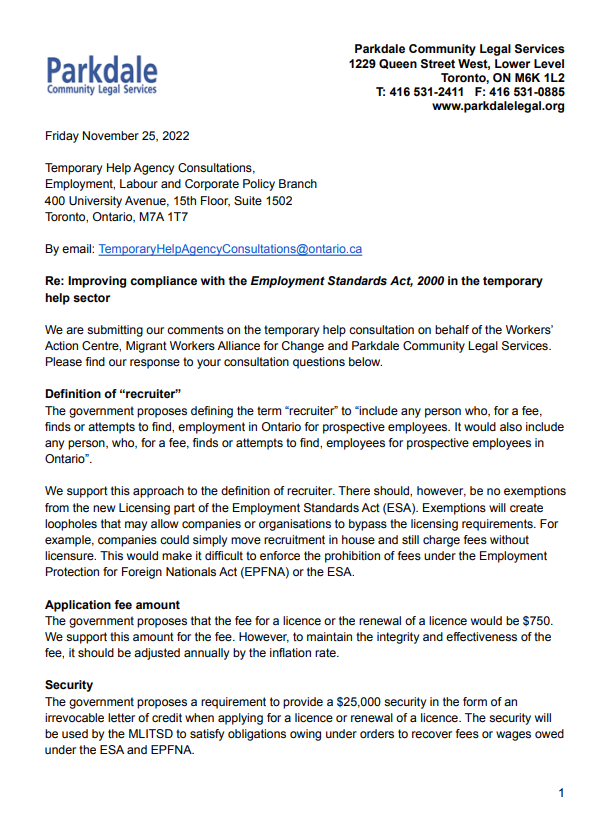
This submission on licensing regulations for temporary help agencies was made on behalf of the Workers’ Action Centre, Migrant Workers Alliance for Change and Parkdale Community Legal Services. Our recommendations would help to ensure that temporary agencies, client companies and recruiters of temporary foreign workers are held accountable for unpaid wages and illegal recruitment fees.

The Ontario government launched a consultation and advisory panel in March 2022 to explore implementing a portable health benefits program for part-time, temporary, and self-employed workers. Though it sounds good on the surface, it is problematic because it would further entrench the creation of a substandard classification of workers without access to basic employment standards as well as incentivize companies that do provide benefits to stop giving them to their most precarious workers.
In this brief, Parkdale Community Legal Services and the Workers’ Action Centre recommend equal pay and benefits for all workers regardless of how they are classified by their employers. We also put forward that the most efficient and effective approach to extending health benefits to part-time, temporary and self-employed workers is fully universal social programs, such as pharmacare and dental care.

Wave after wave of the COVID pandemic has exposed ongoing systemic gender, racial and economic inequalities in our labour market. Now, workers who kept the economy going without adequate protections are coming together to demand legislative change to address precarious work, tackle inequality, and improve wages and working conditions. This report is based on 189 surveys and 27 in-depth interviews with workers in low-wage and precarious work. It provides an overview of the key issues facing workers today, and lays out the employment and labour law changes needed to ensure decent work for all.

As we come out of COVID, it is critical that we act now to address these inequalities. That means strengthening Ontario’s employment laws, closing the gaps and loopholes that give rise to precarious work; eliminating employer incentives to create low-wage, part-time, and unsafe work; enforcing the law and implementing meaningful penalties when employers break the law. Members of the Workers’ Action Centre have developed the comprehensive strategies outlined in this report that, if implemented, offer a pathway to decent work for all.

我们正在逐渐摆脱新冠疫情,我们现在就要采取行动,解决这些不平等现象,至关重要。这意味着,加强安省的劳工法,消除法规中导致工作不稳定的空白和漏洞;消除雇主制造低工资、兼职和不安全工作的动机;在雇主违法时,政府须严格执法,实施有意义的处罚。工人维权中心的成员,制定了本报告总结的综合措施方案,如果得到政府的采纳和实施,将为所有人提供体面工作的途径。

ਜਿਉਂ ਹੀ ਆਪਾਂ ਕੋਵਿਡ ਤੋਂ ਬਾਹਰ ਆ ਰਹੇ ਹਾਂ ਇਸ ਨਾਜੁਕ ਸਮੇਂ ‘ਤੇ ਆਪਾਂ ਨੂੰ ਇਹਨਾਂ ਨਾ-ਬਰਾਬਰੀਆਂ ਨੂੰ ਸੰਬੋਧਨ ਹੋਣਾ ਚਾਹੀਦਾ। ਜਿਸ ਦਾ ਮਤਲਬ ਹੈ ਉਨਟਾਰੀE ਇੰਪਲਾਇਮੈਂਟ ਕਾਨੂੰਨ ਨੂੰ ਹੋਰ ਤਾਕਤਵਰ ਬਣਾਉਂਣਾ, ਵਧੇ ਹੋਏ ਪਾੜੇ ਨੂੰ ਘਟਾਉਂਣਾ ਅਤੇ ਕਾਨੂੰਨ ‘ਚ ਪਈਆਂ ਉਹਨਾਂ ਘਾਟਾਂ ਨੂੰ ਦੂਰ ਕਰਨਾ ਜਿਸ ਕਾਰਣ ਇਹ ਮਾੜੀਆਂ ਜੌਬਾਂ ‘ਚ ਵਾਧਾ ਹੁੰਦਾ ਹੈ; ਨੀਵੇ ਪੱਧਰ ਦੀਆਂ, ਪਾਰਟ-ਟਾਈਮ ਜੌਬਾਂ ਅਤੇ ਖਤਰਨਾਕ ਕੰਮਾਂ ਨੂੰ ਚਲਦਾ ਰੱਖਣ ਲਈ ਮਾਲਕਾਂ ਨੂੰ ਦਿੱਤੀਆਂ ਜਾਂਦੀਆਂ ਸਹੂਲਤਾਂ ਨੂੰ ਹਟਾਉਂਣਾ, ਜਦੋਂ ਮਾਲਕ ਕਾਨੂੰਨ ਤੋੜਦੇ ਹਨ ਉਦੋਂ ਕਾਨੂੰਨ ਨੂੰ ਲਾਗੂ ਕਰਵਾਉਂਣਾ ਅਤੇ ਸਖਤ ਜੁਰਮਾਨੇ ਕਰਨਾਂ। ਵਰਕਰਜ਼ ਐਕਸ਼ਨ ਸੈਂਟਰ ਦੇ ਮੈਂਬਰਾਂ ਨੇ ਇਸ ਰਿਪੋਰਟ ‘ਚ ਬਹੁਤ ਹੀ ਢੁੱਕਵੀਂ ਯੁੱਧਨੀਤੀ ਤਿਆਰ ਕੀਤੀ ਹੈ, ਜੇ ਇਹ ਲਾਗੂ ਹੋ ਜਾਂਦੀ ਹੈ ਤਾਂ ਇਹ ਸਾਰਿਆਂ ਵਾਸਤੇ ਚੰਗੀਆਂ ਜੌਬਾਂ ਲਈ ਰਾਹ ਦਰਸੇਵਾ ਬਣੇਗੀ।

Maadaama laga soo baxay COVID, waxaa aad muhiim u ah in wax laga qabto sinaan la’aanta. Taasi micneheeda wuxuu yahay in la xoojiyo Shuruucda shaqada Ontario, lana tir-tiro dul-duleellada sare u qaadaya shaqooyinka khatarta ah; la cirib tiro dhiiri gelinta shirkadaha in ay bixiyaan mushaar hoose, saacado yar iyo shaqooyin aan amaan ahayn; in la dhaqan geliyo sharciga iyadoo la hirgelinayo ciqaab la dul saaro shirkadaha ku xad gudba sharciga. Xubnaha Ururka Difaaca Shaqaalaha (WAC) wuxuu diyaariyay xeeladaha dhameystiran ee ku xusan warbixintan oo haddii la hirgeliyo horseed u noqoneysa in qof kasta uu helo shaqo hufan.
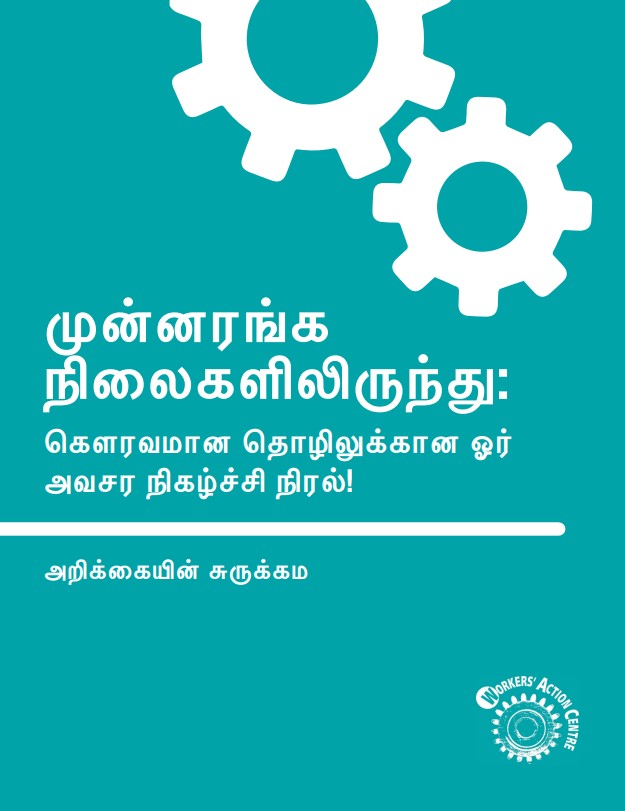
இந்த கோவிட் வைரஸ் தொற்றிலிருந்து நாம் வெளியே வந்துகொண்டிருக்கும் இச்சந்தர்ப்பத்தில், இவ்விதமான ஏற்றத்தாழ்வுகளை இப்போது நிவர்த்தி செய்வது முக்கியமானது.அதாவது ஒன்றாரியோவின் வேலைவாய்ப்புச் சட்டங்களை வலுப்படுத்துதல், ஆபத்து நிறைந்த வேலைகளுக்கு வழிவகுக்கும் இடைவெளிகள் மற்றும் ஓட்டைகளை மூடுதல், குறைந்த ஊதியம், பகுதி நேர வேலை மற்றும் பாதுகாப்பற்ற வேலைகளை உருவாக்குவதற்காக தொழில் வழங்குநர்களுக்கு வழங்கப்படும் ஊக்குவிப்பு சலுகைகளை இல்லாமல் செய்தல்; சட்ட அமுலாக்கலை உறுதிசெய்து, முதலாளிமார் சட்டத்தை மீறும் போது அர்த்தமுள்ள அபராதங்களை விதித்தல் வேண்டும். தொழிலாளர் நடவடிக்கை நிலையத்தின் அங்கத்தவர்கள் காத்திரமான தந்திரோபாயங்களை உருவாக்கியுள்ளனர்.அவைகள் அமுல் செய்யப்படுமாக இருந்தால், அனைவருக்கும் கௌரவமான தொழில் ஒன்றைப் பெற்றுக் கொள்ள வழிகோலும்.

This is a joint submission to the Consultation on Modernizing Canada’s Employment Insurance program from the Workers’ Action Centre and Parkdale Community Legal Services. We emphasize the continued need for Canada Recovery Benefits now as the fourth wave of COVID-19 continues, and the urgency for permanent improvements to the Employment Insurance system in preparation for the next economic crisis or public health emergency.
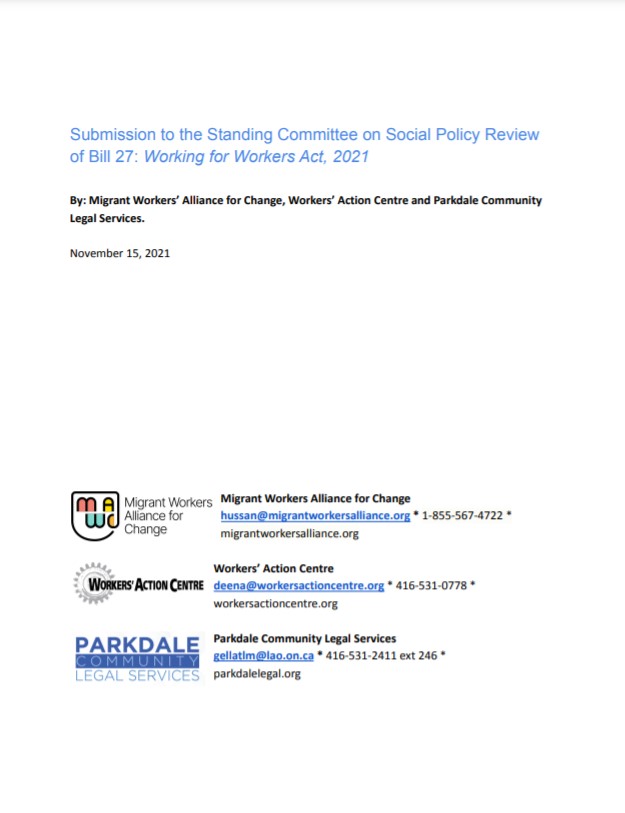
This joint submission by the Migrant Workers Alliance for Change, Workers’ Action Centre, and Parkdale Community Legal Services offers several recommendations to improve Bill 27, Working for Workers Act, 2021.

This joint submission to the OWRAC from the Workers’ Action Centre and Parkdale Community Legal Services focuses on app-based companies’ use of misclassification to avoid their responsibility to gig workers. App-based workers have extremely low pay and unstable, dangerous jobs. We call on the Committee to recognize that gig workers are employees, not a new category of worker, and deserve protection under our basic employment standards. We put forward the demands of the Justice for Workers campaign — including paid sick days, a $20 minimum wage for all, and laws that protect all workers — as the way to improve wages and working conditions in the post-pandemic period.

Although the temporary Employment Insurance enhancements during COVID-19 are essential and welcomed, workers still need permanent improvements. The Inter-Provincial EI Working Group submitted crucial recommendations to the Standing Committee on Human Resources, Skills and Social Development and the Status of Persons with Disabilities. The recommendations fall under the following four categories: 1) better EI financing; 2) easier access for more workers; 3) increased benefits; and 4) improved supports and access to justice for EI claimants. Over 50 community and labour organizations across the country endorse this submission.
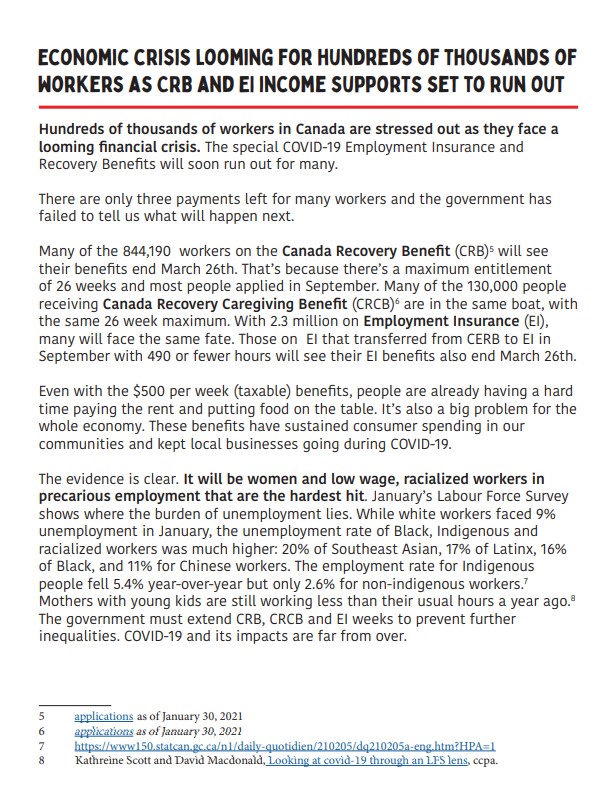
The special COVID-19 Employment Insurance and Recovery Benefits will soon run out for many. People are already struggling to make ends meet with these benefits and cannot do without them. The whole economy is also impacted as these benefits have sustained consumer spending at local businesses during COVID-19.
COVID-19 and its impacts are far from over. The government must extend the Canada Recovery Benefit, Canada Recovery Caregiving Benefit and Employment Insurance until at least December 31, 2021 or until the pandemic is over. A permanently improved Employment Insurance system in terms of benefits and access is also needed.

This joint report from Parkdale Community Legal Services, Workers’ Action Centre, and Migrant Workers Alliance for Change (MWAC) addresses the lack of protection for temporary agency workers who do the most dangerous work for the least pay. The use of temporary agencies likely contributed to the spread of COVID-19 on Ontario farms. Research from MWAC found that the cause of infection and transmission in agricultural workers was poor housing and working conditions, which are controlled by agricultural employers (client companies). Ontario needs mandatory licensing of temporary help agencies and recruiters of migrant workers in order to better protect temporary workers.

Summary of findings of the online survey conducted by the Workers’ Action Centre to hear about the experiences people have had under COVID-19, and specifically the extent to which CERB met their needs, and how they will manage when CERB ends.

When the federal government transitions recipients of the Canada Emergency Response Benefit (CERB) onto a new Employment Insurance program in September 2020, following the principles outlined in this report will ensure that the new program does not leave any workers behind.
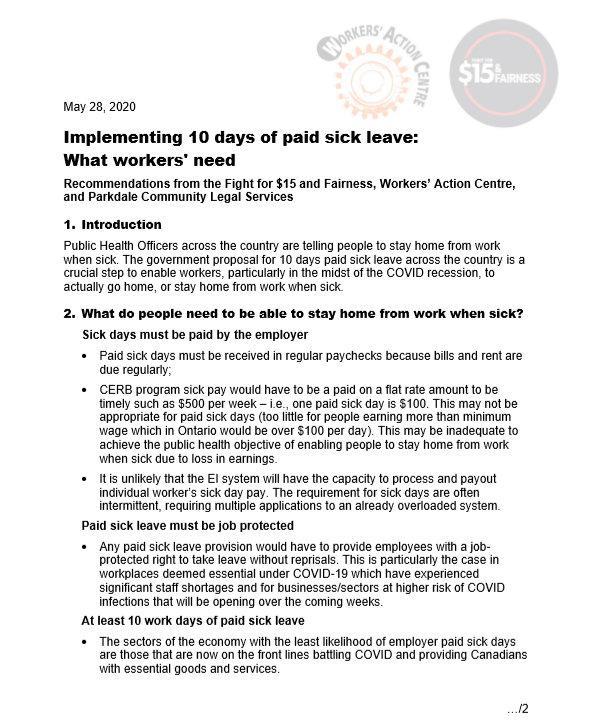
Public Health Officers across the country are telling people to stay home from work when sick. The federal government’s proposal for 10 days’ paid sick leave nation-wide is a crucial step to enable workers, particularly in the midst of the COVID recession, to go home or stay home from work when sick. Fight for $15 and Fairness, Workers’ Action Centre, and Parkdale Community Legal Services jointly offer these recommendations to effectively implement 10 paid sick days.

In our joint submission, Workers’ Action Centre and Parkdale Community Legal Services inform the government that Bill 66, Restoring Ontario’s Competitiveness Act, would increase precarious and low-waged work if passed. It would reduce protections for workers from excessive overtime hours and unpaid overtime premium pay. Also, construction workers within a number of public organizations would lose the protection of the construction industry collective agreement. These factors and more are proof that, contrary to the government’s claims, Bill 66 will fail to bring “good jobs” to the province.
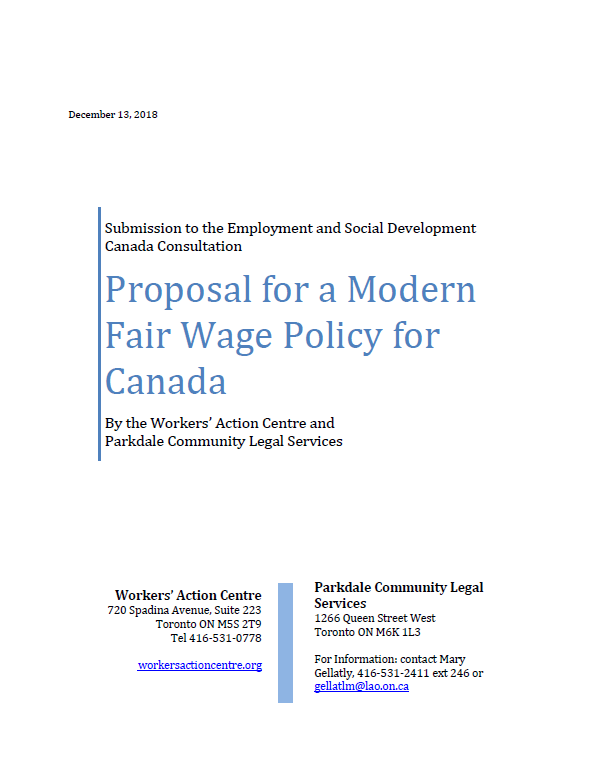
In our submission, the Workers’ Action Centre and Parkdale Community Legal Services urge the federal government to broaden the fair wage act to cover all government contracts and apply through sub-contracting chains. By setting a level playing field for employers bidding for government work, especially when such contracts are awarded on a low-bid basis, fair wage policies can help prevent a downward spiral in wages, benefits and working conditions.
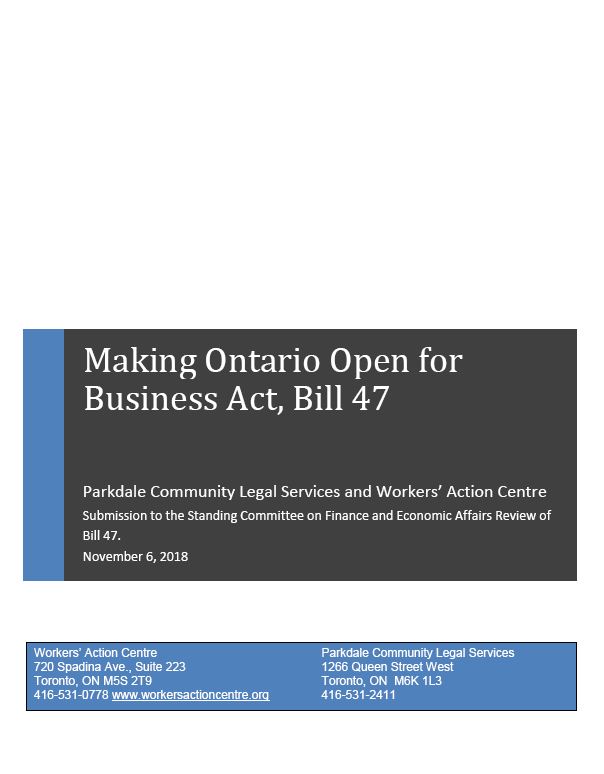
Joint submission by the Workers’ Action Centre and Parkdale Community Legal Services regarding Bill 47 that seeks to cancel the updates to the Employment Standards Act (ESA) and Labour Relations Act (LRA) recently won through Bill 148. The government is pushing Bill 47 through the legislative process despite little consultation with workers in precarious employment who depend on the ESA for protection. We recommend the complete withdrawal of Bill 47. Please download this sample letter and endorse our submission by Thursday, November 15, 2018 at 6:00 pm.

Joint submission by the Workers’ Action Centre and Parkdale Community Legal Services regarding Bill 3 that will eventually require employers with 250 or more employees to make public what they pay their employees. To strengthen this bill, we recommend that all employers be required to comply with pay transparency immediately upon passage of Bill 3. Strong pay transparency requirements on employers are essential for empowering women workers, precarious workers, temp agency workers, racialized, indigenous, and disabled workers to access the new equal pay provisions that came into effect on April 1, 2018.

Joint response by the Workers’ Action Centre and Parkdale Community Legal Services regarding the review of the Canada Labour Code insisting that workers employed in the federal jurisdiction receive at minimum the equivalent benefit, compensation and/or protection to that enjoyed by workers employed under provincial jurisdiction. We join in supporting this principle put forward by the Canadian Labour Congress and the Canadian Union of Public Employees.

Many workers won’t have access to the new rights in The Fair Workplaces, Better Jobs Act, 2017 (Bill 148) because of special rules that exempt employers from complying with basic employment standards and prevent workers from unionizing. Please sign and submit this letter that calls to amend the process for review of exemptions to ensure it can close the gaps and raise the floor of minimum standards for the highest possible number of workers in Ontario. The deadline for written submissions is Monday, January 1, 2018.
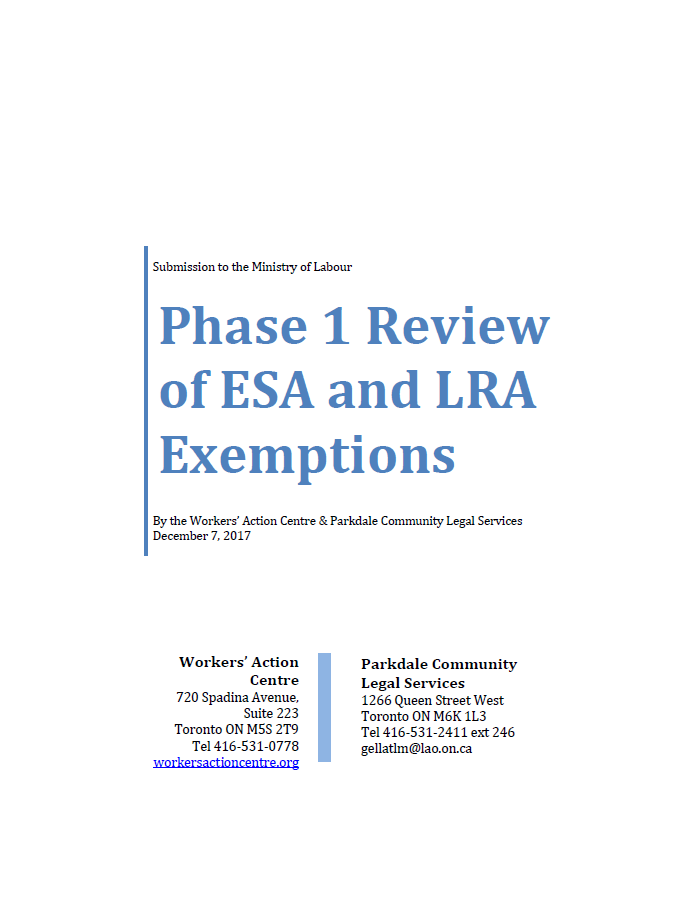
The government announced on May 30, 2017 that it would review exemptions and special rules in the Employment Standards Act (ESA). Phase 1 of the review, launched October 18, 2017, is reviewing eight occupations with exemptions and special rules. The ESA should provide a floor of minimum standards for all, but exemptions prevent this objective, and disproportionately affect women, part-time, temporary, young, and racialized workers. This submission addresses the principles, criteria and process for review of exemptions and special rules and provides recommendations on particular exemptions under review. Please download a sample letter to endorse our submission.

Joint submission by the Workers’ Action Centre, Parkdale Community Legal Services, and the Fight for $15 and Fairness Campaign to the Standing Committee on Finance and Economic Affairs regarding Bill 184: Fair Workplaces, Better Jobs Act, 2017. These are our recommendations to strengthen Bill 148 before its passing, especially in regards to the ability to unionize, new scheduling laws, equal pay for equal work, and termination pay or notice.
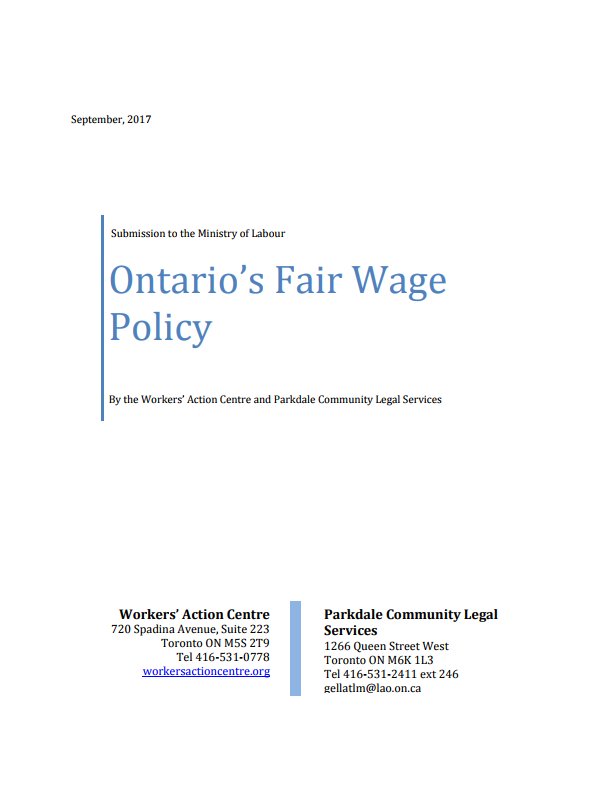
Joint submission by the Workers’ Action Centre and Parkdale Community Legal Services to the Ministry of Labour regarding Ontario’s Fair Wage Policy.

Joint submission by the Parkdale Community Legal Services, the $15 and Fairness Campaign and Workers’ Action Centre, to the Standing Committee on Finance and Economic Affairs regarding Bill 148: Fair Workplaces, Better Jobs Act, 2017. Please consider endorsing our amendments to Bill 148 in your submission; download a sample letter that you can use for that purpose.
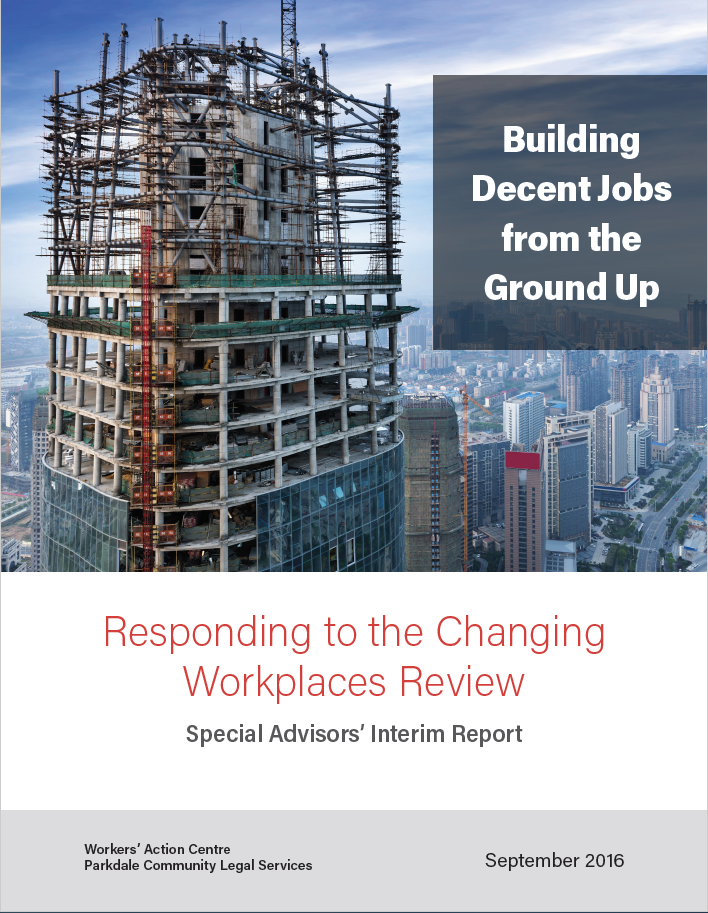
New report by Workers’ Action Centre and Parkdale Community Legal Services responds to the Ministry of Labour’s Changing Workplace Review Interim Report. Special Advisors are accepting submissions until October 14, 2016. Please consider endorsing this report in your submission; download a sample letter that you can edit.

Workers’ Action Centre, in association with Parkdale Community Legal Services, calls on the Ontario government to make Personal Emergency Leave (PEL) accessible to all workers. Ministry of Labour is accepting submissions on PEL until August 31 as part of the Changing Workplaces Review. Due to the exemption of small workplaces from existing PEL provisions, currently one in three workers in Ontario risk losing their job for taking a single unpaid day off to rest while sick or take care of a loved one.
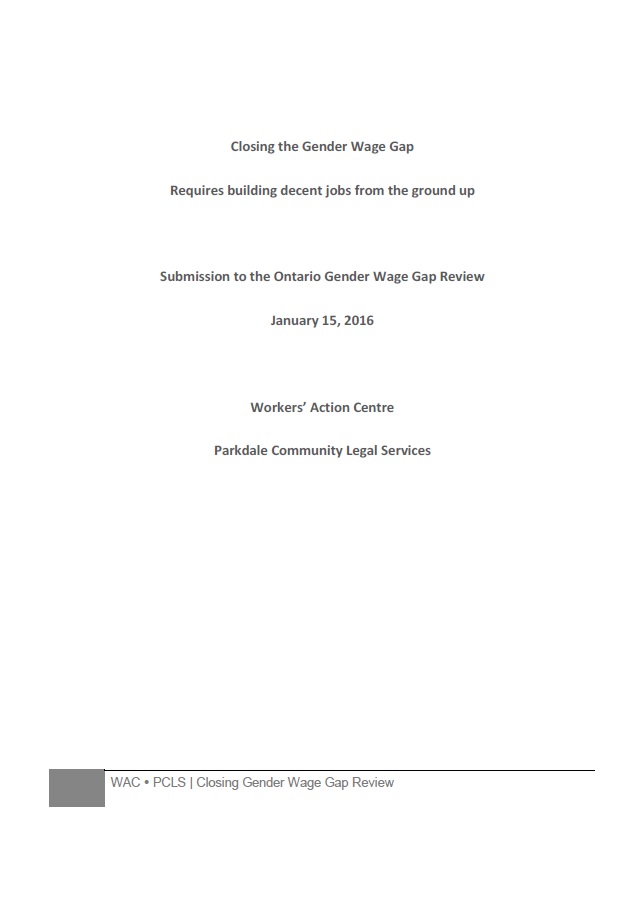
Workers’ Action Centre, in association with Parkdale Community Legal Services, prepared recommendations for Ontario government’s Closing the Gender Gap Consultation.
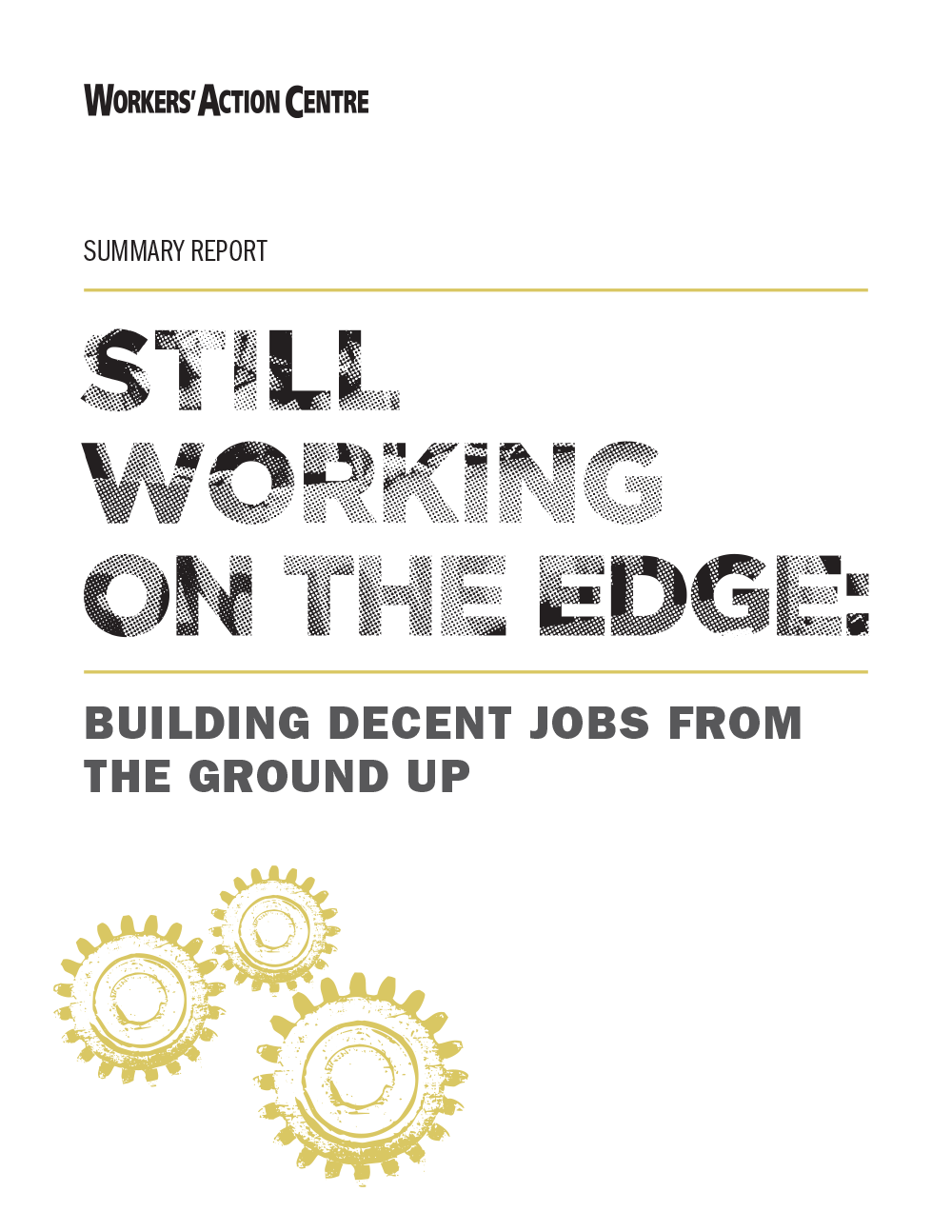
An executive summary is now available for Still Working on the Edge: Rebuilding Decent Jobs from the Ground Up. The Ontario government has launched a review of the Employment Standards Act and the Labour Relations Act to address “the changing nature of modern workplaces”. Building on previous research, Workers’ Action Centre members spent the past year identifying key problems workers are facing in the labour market and developing priorities for change. This report brings workers’ voices, experiences and recommendations to this conversation, contributing knowledge that will be essential to updating Ontario’s labour legislation from the ground up.

The Ontario government has launched a review of the Employment Standards Act and the Labour Relations Act, during which it will undertake “consultations on the changing nature of modern workplaces”. Members of the Workers’ Action Centre have spent the past year, building upon previous research, identifying key problems workers are facing in the labour market and developing priorities for change. At this historic moment, WAC’s new report, Still Working on the Edge, brings workers’ voices, experiences and recommendations to this conversation, contributing knowledge that will be essential to updating Ontario’s labour legislation from the ground up. Download the Executive summary.

This is a brief summary about how the Stronger Workplaces Act will be implemented. It will bring changes to the Employment Standards Act (ESA), Employment Protection for Foreign Nationals Act (Live-in Caregivers and Others), 2009 (EPFNA), Occupational Health and Safety Act (OHSA) and Workplace Safety and Insurance Act (WSIA)

In this joint submission to the Minimum Wage Advisory Panel, WAC joins with Parkdale Community Legal Services and Freedom 90 in calling on the government to raise the Ontario minimum wage to $14/hour.

Based on a survey of 520 workers in low-wage and precarious jobs, this study demonstrates that the lack of protection in Ontario workplaces leaves many workers in significant economic hardship. It is a world of work where wages, overtime and vacation goes unpaid and people work at less than minimum wage.

WAC, in association with the Caregivers’ Action Centre and Parkdale Community Legal Services, prepared recommendations to update employment standards to protect these vulnerable workers. Regulating recruitment practices and employment of foreign workers is essential. However, there are many other issues that need to be addressed to reduce the barriers that foreign temporary workers face in accessing their employment standards rights.

The Workers’ Action Centre and Parkdale Community Legal Services are recommending important amendments to Bill 139 to ensure that the Bill achieves its goal of fairness and protection for temporary agency workers.

WAC’s 82-page research report documents workers’ experiences of precarious work, and features stories from those who live with the grim daily realities of working on the edge. The report also proposes detailed and comprehensive policy recommendations, including reformed employer-practices, equality for all workers, amendments to the Employment Standards Act to cover temp agency workers, changes to minimum wage policy, and more effective enforcement of the Employment Standards Act.

In October 2005, as part of a Federal government review of the Canada Labour Code, WAC (in association with our partner the Employment Standards Working Group) prepared a submission calling for improvements. The Canada Labour Code regulates workplaces under federal regulation – for example, railways, banks, airlines. Much of the Canada Labour Code dates back to 1965 – yet our workplaces have changed radically since then.

The Workers’ Action Centre had its early roots in the Contingent Workers Project. Their study and survey was conducted from October to December 1999. It was initiated to begin to understand the issues that face lower waged temporary workers, contract workers, self-employed and part-time workers, and multiple job holders in Toronto.